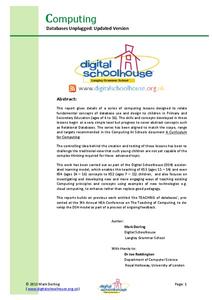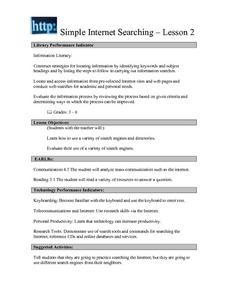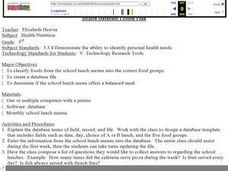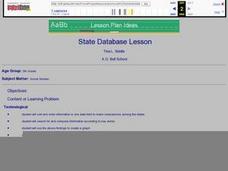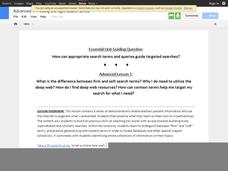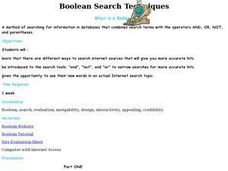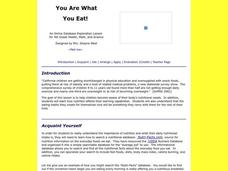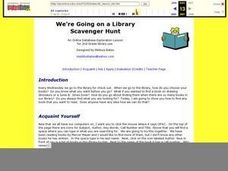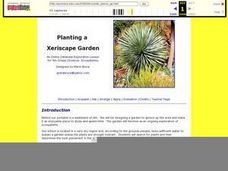Computer Science Unplugged
Computing: Databases Unplugged
How do databases store and retrieve information? The activities in the resource provide fundamental concepts of databases by introducing an approach that teaches the basics without using computers. The pupils act as the actual data that...
Education World
Use Boolean Search Terms to Shorten Web Searches
Have you ever conducted a Web search and received too many hits? Teach your class about Boolean search terms and provide them time to practice conducting efficient online searches. This lesson plan contains several fun activities which...
Curated OER
Simple Internet Searching Lesson 2
Learn how to use search engines and keywords! Learners evaluate the information process using given criteria and determine ways in which the process may be improved.
Curated OER
States Database Searching and Sorting
Fifth graders search and sort prepared databases for information to use in classroom projects, locate, gather, evaluate, organize, and analyze information.
Curated OER
Health Database Lesson Plan
Third graders demonstrate the ability to identify personal health needs. They classify foods from the school lunch menus into the correct food groups. A database file is created. They determine if the school lunch menu offers a balanced...
Curated OER
Database in Social Studies
Fourth graders search a database for information on North Carolina lighthouses and Old Mills. Using their research, 4th graders generate further questions on these subjects and then research the answers.
Curated OER
State Database Lesson
Fifth graders create a database about the geography of the United States. The access to a computer is essential for this lesson. The outcome is that technology is used as a tool to measure student understanding of geographical locations....
Curated OER
Metrically Me!
Young scholars define the parts of a database, search strategies to locate information electronically, create/modify databases, etc. and enter data into a prepared spreadsheet to perform calculations.
Curated OER
Artfully Searching for Treasure
Search for artwork using online museum databases. Young artists will create their own online art treasure hunts based on a specific theme and set of criteria.
Google
Advanced 1: Picking the Right Search Terms
Many people, when searching online, will type in what they are looking for without much thought. But what's the next step, if they don't get the desired results? Careful selection of search terms. Your class can develop a sense for...
Curated OER
Land or Sea?
Sixth graders access a database to search for desired information, using "and" or "or" connectors where necessary. They choose a connector and search a prepared database of European countries to locate which countries border certain...
Curated OER
Boolean Search Techniques
Students search using the Boolean search model. In this navigating the Internet lesson, students narrow their searches using and, or ,not and parentheses. Students recognize the differences in a one word search and one of multiple...
Curated OER
InfoWeb - Computers as Accessing Tools: Distant Databases
Fourth graders complete searches on the computer to find certain pieces of information regarding North Carolina's state parks, amusement parks, and other places of interest. Pairs of students work together to create a list of things they...
Curated OER
Advanced Information Systems Database Access
Learners investigate the usage of databases. They design and create their own databases to hold information. They edit the file and sort/ index the new database. They also generate a detailed report of the data present.
Curated OER
Smart Keyword Searching
Students explore various methods for completing effective keyword searches on the Internet. Through guided practice students complete various keyword searches. They independently complete a worksheet designed to aid in their keyword...
Curated OER
Finding Your Way in the World Wide Web
Researchers practice grouping items to explore the concept of a database. They apply these concepts to the WWW search engine format and consider why it is important to enter the most specific information.
Curated OER
You Are What You Eat!
Fourth graders discover the nutritional needs of their bodies. Using a database, they research how nutrition affects their learning capabilities. They take the food they eat on a daily basis and discover its nutritional value. They...
Curated OER
We're Going on a Library Scavenger Hunt
Second graders participate in a library scavenger hunt. Using a database, they practice typing in words to search for as they look for a book. They complete a worksheet with instructions to finish the scavenger hunt. To end the lesson,...
Curated OER
Get Ready For Some Football
Sixth graders compare and contrast the totals from two national football teams for the year. Using the internet, they search for the information they need and create a data bar graph. They use the information they collected to answer...
Curated OER
Planting a Xeriscape Garden
Fourth graders use a plant database to discover new vocabulary associated with plants and ecosystems. Using a pile of dirt behind their school, they design a garden to make it a more enjoyable place. They print out the types of plants...
Curated OER
Food Chain
Fourth graders use a database on animal diversity to complete the lesson. Using the information, they discover how organisms are linked to one another by their dependence on each other for food. In groups, they develop their own food...
Curated OER
Birds - Beaks and Feet
Second graders use an online database to research information about bird's beaks and feet. Using that information, they discover what foods they eat and where they live. In groups, they cluster the food/habitat and beak/feet data to make...
Curated OER
Dino-Facts!
Students use a database to gather facts about dinosaurs. They practice searching about specific dinosaurs that are of interest to them. To end the instructional activity, they write a story describing the behaviors, eating habits, and...
Curated OER
Student Census
Students collect data from their peers and store the information in a database. As students manage the information they realize the usefulness of a database as a tool to manage large amounts of information in an efficient and accurate...


